- Home
- Fannie Flagg
The Wonder Boy of Whistle Stop Page 17
The Wonder Boy of Whistle Stop Read online
Page 17
“Mr. Virgil and I would like the opportunity to challenge rule 246 established in 1947, which states, ‘Residents may not under any circumstances feed or keep any animal on premises,’ on grounds that this rule is outdated and inhumane.
“This same law restricts residents from keeping even a tiny little songbird. Mr. Virgil and I further contend that of all the age groups, seniors in particular need something alive around them. Something they can love and care for. And with so many little homeless animals needing homes, we believe that changing this rule would be beneficial for all parties.
“Now, as shareholders in Briarwood Manor, Inc., we as residents have the majority of votes to overturn laws as we see fit. So let me put it to a vote. How many would not object to a neighbor keeping a small animal, and if you could, would any of you be interested in having a kitten?” Bud looked out across the room, and several hands went up at once. One by one, many others slowly followed.
Bud looked out. “Good. Okay, then let’s discuss the possibilities of…”
But before Bud could continue his speech, a lady in the third row stood up and said, “Hey, Bud, how about rabbits? They don’t bark and they can be housetrained.”
Several people in the audience nodded and murmured in agreement.
Another man in the back shouted out, “What about ferrets? I love ferrets.”
Mr. Merris moaned and sank down lower and lower in his seat. When the meeting ended and people lined up to come up onstage and pet Virgil, he could see the handwriting on the wall. And two days later, after the official vote was taken and sent to the board, his goose was cooked.
When Bud heard the news, he looked over at Virgil, who was curled up on his new KittyTower sound asleep. “Well, Virgil, you’ve scored a big victory, and you don’t even know it.”
Within the first six months, five baby kittens and three senior cats found permanent homes at Briarwood, and a lot of the residents were now working with the local ASPCA, fostering kittens and bunnies, one ferret, and one baby owl until they could find good homes for them.
And it was so pleasant to walk down the halls and hear the cheerful little bird tweets coming from the rooms. Even Mr. Merris had to admit there was a lot more happy chatter at the dinner table every night. The residents had a lot of fun showing each other photos of their pets and swapping stories about all the cute and funny things they’d done that day.
And even Mr. Merris started bringing his little dachshund Winnie to work with him.
* * *
—
A MONTH LATER, Bud was moved into a larger apartment on the ground floor with a nice window for Virgil. Later he said, “You know, Ruthie, whenever I come back to my place and see those two orange ears in the window waiting for me, it just means the world to me.”
RUTHIE WAS FLIPPING through one of her old Veranda magazines and wishing she had the money to redo her living room when her father called.
“Hey, honey.”
“Hi. What are you up to today?”
“Well, I’m making a few little changes to my will, and I need to talk to you about something.”
“Oh, Daddy, I don’t want to talk about wills. You know it upsets me.”
“I know, honey, but here’s the thing. Now, I’m not saying that it will, but if anything should happen to me, I need to make arrangements for Virgil.”
“Oh.”
“And my question to you is, would it upset you terribly if Lois took him? She knows I’m doing my will, and she asked me if she could have him. She lives across the hall and she just loves him. But now, if you want him, I’ll just tell her that I’m leaving him to my daughter.”
“No, no. That’s all right, Daddy. Listen, if she wants him, let her have him.”
“Well, I’m glad, Ruthie. I think he’d be happier staying here, in a place he’s used to. And he likes Lois. So good. She’ll be glad to hear it.”
“Was that all?”
“No. There’s something else. Do you remember that surprise I told you that you were getting when I died?”
“Yes?”
“Well, I have decided not to wait. I’m giving it to you now.”
“Oh my gosh, what is it?”
“Are you ready?”
“Yes.”
“It’s your mother’s frog collection. I know you probably thought we gave them away when we moved, but I saved them for you. There are over two hundred of them. I had them in storage, and I’m having them sent over to you. So what do you think? Are you surprised?”
“Speechless.”
* * *
—
WHEN SHE HUNG up, Ruthie felt a slight sense of relief. If anything ever happened to Daddy, of course, she would have taken Virgil. But it sounded like he would be better off with Lois. Then she wondered, who was Lois? And how did she know Daddy was doing his will? Of course, Daddy giving her the inheritance now was a sweet thought. But looking around the room, she wondered what in God’s name was she going to do with two hundred frog figurines.
ATLANTA, GEORGIA
December 2015
RUTHIE GOT IN the car and immediately wiped her hands with the disinfectant gel she kept in the glove compartment. She looked at her hair in the rear-view mirror and sighed. Just as she had thought. One side of her hair was definitely shorter than the other. Not only had Mimi given her a terrible haircut, she had probably given her the flu as well. And right before Christmas, too. Of course, Mimi hadn’t told Ruthie she was sick until her head was in the bowl and her hair was soaking wet and covered in shampoo. It was only after Mimi started coughing that she said, “Sorry. I’ve got the flu, but I came in anyway. I hate to disappoint my customers.” Ruthie had spent the next hour trying not to breathe.
Later, as she pulled into her driveway, she waved at Martha Lee’s small army of gardeners who were busy stringing Christmas lights and raking leaves.
When she walked into the house, she saw that her message light was blinking and pushed the button. It was her daughter Carolyn, telling her how sorry she was, but she was not going to make it home to Atlanta for Christmas. She didn’t say why. But it really didn’t matter. The point was that Ruthie and her dad would be spending another Christmas alone. Ruthie had spent Thanksgiving at Carolyn’s house in Washington last year. But anytime she tried to help, cook, or even wash the dishes, Carolyn would stop her. “No, Mother, don’t do that. You just go sit in the living room and enjoy yourself.”
Her son, Richard, was a different story. His lack of enthusiasm for a career in business had been somewhat of a disappointment to Brooks, because he’d hoped that one day Richard would join the family business. But Richard had chosen a different route in life. He and his girlfriend, Dotsie, were now living off the grid in a small town in southern Oregon. Both were vegan and avid bicyclists who grew their own kale.
Last summer, when Ruthie had visited them on their small farm, she’d almost starved to death. She dearly loved her son, and Dotsie was very sweet, but kale just wasn’t her thing. By the end of the week, she would have killed for a cheeseburger.
But Richard and Dotsie seemed extremely happy. And Carolyn, who lived in the very thick of Washington’s social world, was not just happy, but deliriously happy. For different reasons, both of her children were doing just fine. Ruthie seemed to be the only one floundering at the moment.
Lately she had begun to wonder whether this feeling of uselessness she had, had nothing to do with them. Maybe it was that she needed to get out and do something other than sit in the same house, on the same Circle, in the same rut for the rest of her life. Dear God, from where she started out in life, full of hope and ambition, how in the world did she wind up here? She went upstairs and got into bed, waiting for the flu to hit.
* * *
—
A FEW HOURS later, just as Ruthie was about to get up from h
er nap, the phone rang. It was Evelyn Couch calling from Birmingham.
“Hey. What are you doing?”
“I’m in bed with a bad haircut. How about you?”
“I’m bored.”
“Oh God, me too. I’m so bored, I’m even boring myself.”
“Hey, Ruthie, I’ve been thinking. You’re bored. I’m bored. So, you wanna have a little fun?”
“Sure. As long as it’s legal.”
Evelyn laughed. “It is. How about you coming over to Birmingham this weekend? I have a little something I want to run by you.”
“I’ll be happy to come, but don’t look at my hair.”
“I promise. Text me when you have an ETA.”
Evelyn’s call couldn’t have come at a better time. Now that she had something to look forward to, Ruthie felt much better. And they always had a good time together.
Ruthie wondered if what she wanted to run by her was the possibility of the two of them taking another trip. Evelyn had planned the last one. In May they’d gone on a cruise to Hawaii together and had a ball. They had even taken hula lessons on the ship. Ruthie had to admit that although Evelyn was older, she could sure swing those hips. When she told Evelyn that, Evelyn laughed and said, “Well, honey, I’ve got a lot more hips to swing.”
It had been so good to get away from the Circle and Martha Lee for just a little while. One night, when they were at poolside on the ship enjoying their piña coladas, Ruthie suddenly realized something and turned to Evelyn. “You know, Evelyn, you’re my Ninny Threadgoode.”
“What do you mean?”
“Well, I was feeling so down, then you called and here I am, sailing on the deep blue sea without a care in the world.”
Evelyn said, “And if it hadn’t been for Ninny, I would never have met you or your father. Or Virgil.”
Evelyn picked up her piña colada and held it up. “Let’s drink to Ninny Threadgoode.”
Ruthie joined her, “Hear! Hear! To Ninny Threadgoode. Wherever you are!”
Just then, the Hawaiian orchestra started playing “Lovely Hula Hands” and Evelyn turned to Ruth. “Wanna do it?”
“Oh, why not. You only live once, right?”
“Right, and if you’re lucky, twice!”
Once they were out on the dance floor doing the hula steps they had just learned, a man named Morrie at the next table whispered to his wife. “Irma, look at those two gals go. That heavyset one sure can move.”
KISSIMMEE, FLORIDA
1989
IDGIE HAD ALWAYS threatened to come up to Maryland and visit Bud and Peggy, but she never had. After Julian died, she was left to manage his orange groves and run her fruit and honey stand alone.
And then, too, she had been busy tending to official duties. After many years of her holding court at the fruit stand, everybody in town had started calling Idgie “The Mayor,” and ten years later, darned if they didn’t officially elect her as the first female mayor of Kissimmee. At the time they’d made a big deal out of it, and The Miami Herald sent a reporter to interview her. But Idgie, being Idgie, had her photo taken alongside two of Julian’s old nanny goats, telling the reporter that they were senior members of her city council.
* * *
—
DURING THOSE YEARS, Bud and Peggy had planned to get back down to visit her, too, but they had been so busy running the clinic together and raising Ruthie that they had not made it. Bud would never forgive himself for that. Idgie had raised him, paid for his college, and encouraged him all his life. He and Peggy had planned to retire in Florida, and buy a house next to Idgie. It would be so much fun. They could go fishing, and bang around in the woods just like the old days. But that had never happened.
Idgie hadn’t told them how ill she was, or they would have moved heaven and earth to get down there sooner. They thought they had all the time in the world. So had Idgie. She never did slow down, but finally, after she got so weak she couldn’t do things for herself, she moved to a local nursing facility. Every day, up until the last few days, her room was filled with visitors and AA friends.
When the doctor told Helen, a hospice nurse who had been taking care of Idgie, that it was time to call in the relatives, it was sad news. Helen had grown so fond of Idgie these past weeks. So after having a good little cry in the bathroom, she pulled herself together and went into Idgie’s room.
Idgie smiled at her weakly and said, “Good morning, sunshine.”
Helen started moving some of the flower arrangements around, and casually said, “Honey, the doctor thinks it might be a good idea if we call Bud, and just let him know you’re here.”
Idgie looked alarmed and struggled to sit up. “Oh, Helen, no. Promise me you won’t call Buddy.”
“Well, sweetie, don’t you think he should know?”
“No. That boy is busy and he doesn’t need to run all the way down here. It’ll be too upsetting for him to see me lookin’ like an old bag of bones. Promise me you won’t call him.”
“Well…if that’s what you want.”
“It is. And, besides, I’m ready to go on to a better place, as they say.” Then she winked at Helen. “Unless, of course, I go straight to hell. But that wouldn’t bother me. Hell couldn’t be any hotter than Florida in August.”
* * *
—
THEY SAID SHE had a peaceful ending. When Helen called Bud and let him know, she explained to him why she had not called him sooner. He was sad to hear it, but he understood. Idgie knew it would have been too hard on both of them. Besides, in her will, she had named Bud as her sole heir, so there could be no guessing on his part about how she felt about him. It had been easier for her to say goodbye that way. Idgie hadn’t wanted a service of any kind. All she wanted was to be taken back to Whistle Stop and buried next to Ruth and the rest of her family. And she was.
Imogene “Idgie” Threadgoode
1908–1989
HAPPY TO BE HOME
BIRMINGHAM, ALABAMA
RUTHIE ARRIVED AT Evelyn’s house just in time for lunch, and after they had caught up on all the news, Ruthie said, “I’m curious, what was the idea you want to run by me?”
Evelyn smiled. “It’s just a little something I’ve been thinking about.”
“What?”
“About the two of us and our situations. I’m a widow, and you’re a widow.”
“Sad but true.”
“So, do you think you’ll ever get married again, Ruthie?”
“I don’t think so. I could never find a man to take Brooks’s place. He was the one and only for me. But what about you?”
“Definitely not. I like being single. Besides, all the men my age want young chicks, or else they want somebody to take care of them.”
“That’s true.”
“So, Ruthie, what are we going to do with the rest of our lives?”
Ruthie looked at her and said, “Funny you should ask. I have absolutely no idea.”
“Well, funny enough I do. Finish your tea and get in the car.”
* * *
—
AS THEY WERE driving, Evelyn had a big smile on her face, and that piqued Ruthie’s curiosity even more. She still didn’t know enough about Birmingham to know where they were going, but as far as she could tell, they seemed to be driving out of town and then circling around.
“Where are you taking me? Back to Georgia?”
“You’ll see…soon enough.”
Evelyn followed the voice on her GPS and made a left turn and drove down a long, one-lane gravel road and pulled up to a spot by some railroad tracks and stopped the car. “Here we are.”
Ruthie looked around. There was nothing much to see but junk and a bunch of old vine-covered buildings. “I guessed that, but where is here?”
“Hop out and I’ll
show you.” Ruthie got out and Evelyn said, “Welcome to Whistle Stop.”
“What? You’re kidding. This…is Whistle Stop? Oh my gosh. Are you sure?”
“Yes, I’m sure. I just bought it.”
“What?”
“I own it!”
Ruthie looked around at the piles of junk and weeds everywhere. “But why would you buy it?”
“Well…you’re looking for something to do, and so am I. So, let’s you and me open up the old Whistle Stop Cafe again. And maybe even the whole town. Wouldn’t Bud love that?”
“Of course,” said Ruthie. “He would be thrilled, but how can we do it? I mean, look, it’s all falling down.”
“Easy. I had my guys look into it, and they can get some of the original building plans from the county planning office. We save what buildings we can, and then rebuild what we can’t, following the old plans.”
“Really?”
“Yes. So what do you say? It’ll be a lot of fun. I know it’s a big project, but we can do it.”
“But, Evelyn, won’t it cost a lot of money to do something like that?”

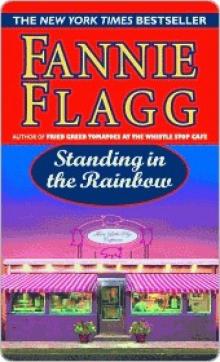 Standing in the Rainbow
Standing in the Rainbow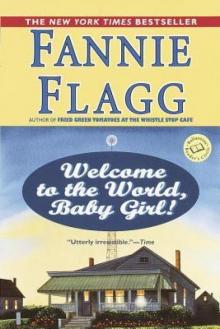 Welcome to the World, Baby Girl!
Welcome to the World, Baby Girl!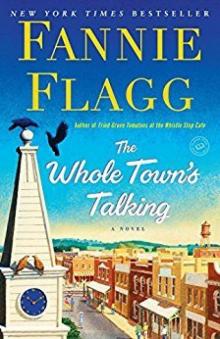 The Whole Town's Talking
The Whole Town's Talking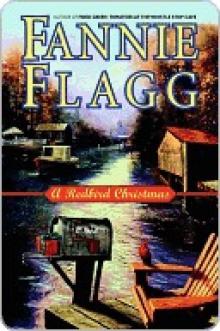 A Redbird Christmas
A Redbird Christmas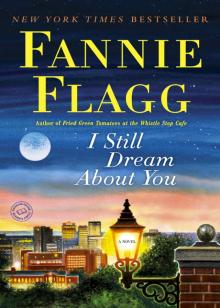 I Still Dream About You
I Still Dream About You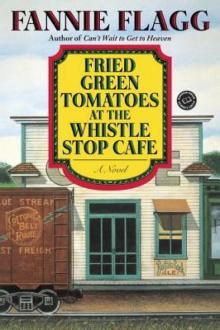 Fried Green Tomatoes at the Whistle Stop Cafe
Fried Green Tomatoes at the Whistle Stop Cafe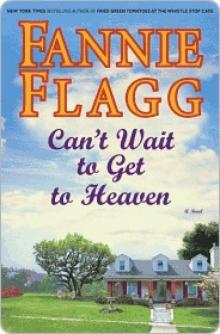 Can't Wait to Get to Heaven
Can't Wait to Get to Heaven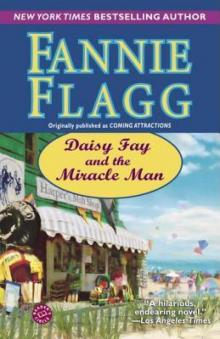 Daisy Fay and the Miracle Man
Daisy Fay and the Miracle Man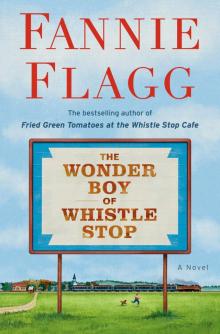 The Wonder Boy of Whistle Stop
The Wonder Boy of Whistle Stop The All-Girl Filling Station's Last Reunion
The All-Girl Filling Station's Last Reunion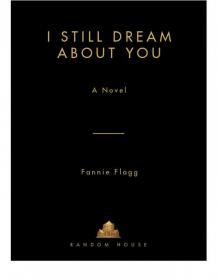 I Still Dream About You: A Novel
I Still Dream About You: A Novel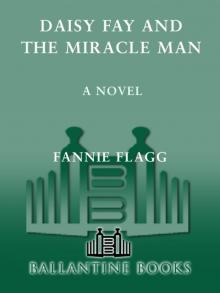 Daisy Fay and the Miracle Man: A Novel
Daisy Fay and the Miracle Man: A Novel